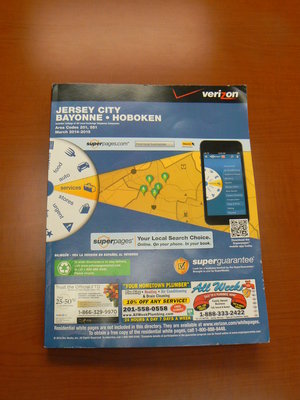Jailyne Aguilar, 17, a junior at Bayonne High School, knows what a phone book is, but she has only used it once.
“It was a very long time ago,” she said.
It was seven years ago, to be exact – when Aguilar was 10 years old.
“I use my phone, Facebook, and stuff like that,” she said.
When asked if she knew what the “yellow pages” were, Aguilar responded, “Yes, I know the yellow pages. It’s the big book with all the information and numbers.”
Twin sisters, Wasam and Walena Youssef, 16, of Bayonne, also knew what the yellow pages are, and Wasam had used them in class as a school exercise. But Walena has never used them.
Earlier this year, Verizon distributed stacks of business yellow pages in Hudson County. They produce an edition for Hoboken, Bayonne, and Jersey City, and one for North Hudson towns like Weehawken, Guttenberg, Secaucus, North Bergen, Union City, and West New York.
But they don’t print the white pages, with residential listings, anymore.
“We stopped printing white pages about four years ago,” said Lee Gierczynski of Verizon, based in Pittsburgh, “simply because residential white page use had decreased considerably due to the internet and smart phone and other ways people were looking for phone numbers.”
Gierczynski added, “Our focus was, and is, on sustainability. The discontinuation resulted in reducing about 1,400 tons of New Jersey waste stream each year. That was a significant reason as well.”
A longtime American tradition is ending. It came down to the simple principle of supply and demand.
“There was a lack of usage,” Gierczynski said.
Mixed reactions
But not everyone has stopped using the books.
Karen Gray of Bayonne mostly uses her cell phone to make her calls now, and to search for information.
“I grew up with phone books; occasionally I’ll use them, but not too much,” Gray said. “I use the internet more. I just go to Google. You can get any piece of information you want.”
Some residents hoped the yellow pages would stick around, while others did not.
“I don’t use the phone book anymore,” said Cindy Nino, 34, of West New York. “I don’t remember the last time I used it. I have an iPhone, so I can look up everything over the internet.
I use it to search for local businesses. That’s it; I don’t need the phone book anymore.”
Darwin Espinal, 24, of North Bergen agreed.
“The last time I used a phone book was before 9/11,” Espinal said. “I was using it to find a relative that lived in New York, and that none of my family had a phone number for.”
For anyone counting, that would have been more than twelve years ago.
But Espinal’s not against them. “I personally believe phone books should continue to be made,” he said. “Because they do come in handy.”
Former Weehawken resident Bill Morrow, 53, a film archivist knowledgeable in all types of technology, feels that the availability of modern media makes physical phone books unnecessary.
“I don’t use them,” said Morrow, who now lives in Hoboken. “The last time was probably a couple of years ago. I use Google. Some people like phone books. I think older people still prefer them. ”
Kiwanis phone book
Retiree Maribel Anota of Secaucus said she relies on a smaller phone book, 5 by 7 inches in size, produced by a local service organization.
“I rely more on our town’s Kiwanis phone book,” she said. “It has more on government, hospitals, churches, charitable organizations in town, the Police Department. It has a little advertising and has restaurants, dry cleaners, doctors, and dentists. It’s handier than the big one. It’s more helpful.”
In her condominium project, they leave the regular yellow pages outside on doorsteps, but few people pick it up, she said.
“They sit there for a while and then get thrown out,” she said.
Gaining approval
When the phone company wanted to stop printing the white pages, they first had to go to the New Jersey Department of Public Utilities to get approval to put the book online.
“Go to www.verizon.com/white pages and you can get residential listings there,” said Gierczynski. “It presents you with a map and wherever Verizon has directories you can click on the state. You can look for listings for any community in New Jersey that Verizon serves.”
They have a North Hudson residential online site.
“You go to it, type in a name, say ‘John Smith’ and search,” Gierczynski said. “White pages will show where [electronic] books are still published.”
A company called yellow pages continued to publish residential white pages until about 2010, and no longer offers them in New Jersey, or anywhere in the United States.
“The change mirrored the adoption of the internet, which naturally impacted residential page usage,” said spokesman Jon Salmon, who is based in the United Kingdom. “In addition, with the increased number of cell phones and smart phones, people are increasingly storing numbers in their devices.”
Different publishers
And while the Verizon yellow pages still exist, Verizon doesn’t produce them anymore. They now contract Dex Media of Dallas to publish the directories for North Hudson and for Jersey City/Bayonne/Hoboken.
“There’s still a need for the business directory,” Gierczynski said. “They contain yellow pages and business, and government listings as well, and there’s still a segment of the population that uses those listings when looking for those services. People who need a plumber quickly, or an attorney, they look though the ads in the yellow page directory.”
Besides Verizon, there are “hundreds” of telephone directory publishers in the United States. An internet search turned up AT&T, Bell, and other companies that still publish them.
But that shouldn’t be surprising, according to Gierczynski.
“It’s an unregulated industry, so really anyone can publish one if they want,” he said.
E-mail joepass@hudsonreporter.com.
